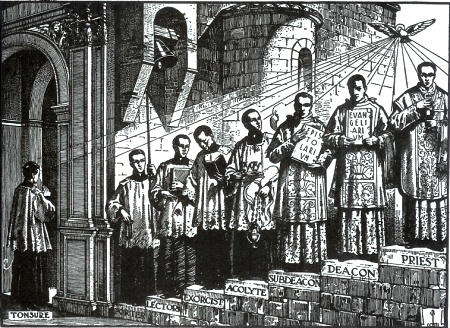
The minor orders are the lower degrees of the ecclesiastical hierarchy, in contrast to the “major” or “sacred” orders. In the Latin Church, there are four minor orders: porter, lector, exorcist, and acolyte. They are all mentioned in a letter of Pope Cornelius to Bishop Fabius of Antioch in A. D. 252. More recently, the Council of Trent of July 15, 1563 said of the minor orders and subdiaconate:
... From the very beginning of the Church the names of the following orders and the duties proper to each one are known to have been in use, namely those of the subdeacon, acolyte, exorcist, lector, and porter, though not of equal rank; for the subdiaconate is classed among the major orders by the Fathers and the sacred Councils, in which we also read very frequently of the other inferior orders (D.958).
Minor orders are conferred by the presentation to the candidate of the appropriate instruments of his office, in accordance with the ritual given in the Satuta Ecclesiæ antiqua, a document which originated in Gaul about the year A.D. 500. This ritual was later introduced in Rome. By the ordination to any of the 4 minor orders, the recipient receives official authority to perform the liturgical functions of this office.
Porter or doorkeeper (ostiarius in Latin; from the word ostium, a door), denoted among the Romans the slave whose duty was to guard the entrance of the house. From the end of the second century, the Christian communities began to own houses for holding church services. Church doorkeepers were found at least in larger cities. The texts of the ritual clearly express the duties of the porter as well as the virtues he must practice, especially zeal for the house of God.
Lector is someone who is sufficiently educated to be able to read publicly the Sacred books in the Church. The text of the ritual requires from the lector clear and precise diction as well as the understanding of the words of Sacred Scripture. The first mention of a Christian liturgical reader is by St. Justin, who died a Martyr, in A.D. 165.
The word Exorcist finds its origin in the Greek language. In general, it refers to anyone who casts out or professes to cast out demons. IN particular, It refers to him who is ordained or appointed to this office by the bishop. IN the early ages of the Church, this function was not confined to clerics. But with the development of the rites of baptism (since catechumens had to be exorcized every day by an imposition of hands), some clerics were specially appointed o this office. Currently only priest are authorized to use the exorcizing power conferred by this ordination. In each diocese, the local bishop appoints a priest to the special task of casting out demons from the possessed.
Acolyte, in Greek, means someone who follows, who attends. The chief duties of an acolyte are to light the candles on the altar, to carry them in procession and during the solemn singing of the Gospel. He is also in charge of preparing the wine and water for Mass. Unlike the other minor orders, the ritual of the ordination of acolytes ends with three prayers of blessing instead of one. This underscores the importance of the minor order of Acolyte, the last step before the “sacred” or “major” orders.
Since 1972, minor orders are no longer conferred in the Latin Rite, except in those communities where the 1962 liturgical books are in use.
Monasteries and Orders who observe Minor Orders:
- Canons Regular of the New Jerusalem
- Institute of St. Philipp Neri
- Priestly Fraternity of St. Peter
- Apostolic Administration of St Jean-Marie Vianney, Brazil
- Le Barroux
- Servants Minor of St Francis
- Clearcreek Monastery
- Religious Institute of the Holy Cross of Riaumont
- Canons Regular of the Mother of God [ French ]
- Canons Regular of the Mother of God [English]
- Abbaye Fontgombault
- Institute of Christ the King
- Fraternity of St. Vincent Ferrer
- Opus Mariae Mediatricis
- Oblates of Mary
2 comments:
The Orthodox still maintain these, IIRC. I guess the more adverse towards reunion might see our getting rid of them as another sign of our heterodoxy :-P
Additional to your comments, it might be worthy note that the "Minor Orders" are now reduced to the sacramental state and that any Ordinary may bestow them.
This means that if a request is made to the local ordinary by a traditional parish or community it is within his gift to grant the "Minor Orders" to any layman who is deemed acceptable.
This may become a valuable window for a resurgent tradition.
Post a Comment